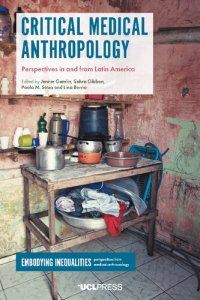
Ebook: Critical Medical Anthropology. Perspectives in and from Latin America
- Genre: Other Social Sciences // Ethnography
- Tags: Medical Antrhopology, Antropología médica, Antropología de la salud, Critical Medical Antrhopology, Antropología médica crítica, Latin America, América Latina, Antropología latinoamericana, Latin American Anthropology, Acceso a la salud, Salud materna, Susto, Lima, Brazil, Mexico, Peru, HIV/AIDS, Guatemala, Sociedad latinoamericana, Latin American Society, Epidemiology, Epidemiología, Sociología de la salud, Latin American critical medical anthropology, Critical Epidemiology
- Series: Embodying Inequalities: Perspectives from Medical Anthropology
- Year: 2020
- Publisher: University College London (UCL Press)
- City: London
- Language: English
- pdf
Latin American critical medical anthropology (LA-CMA) is a product of
its context. Social histories of inequality, ethnocide, racism and internal
and external colonialism, aggravated by a spate of dictatorships interspersed by foreign military interventions, civil war and rebellion, have
marked Latin America and its academic production as deeply as its richly
diverse cultural and ethnic landscape. When universities took on a central
social role during the decades of economic development in the 1940s–
60s, academic voices began generating critical commentary regarding
the human fallout of economic, political and social processes. Anthropological and sociological works that documented similar and contrasting social patterns in Central America, Mexico, the southern cone and
Andean regions contributed to critical debates drawing on Marxist and
Gramscian thought, dependency theories and Soviet-era communism,
while Catholic liberation theology and indigenous epistemologies added
ideological and ideational perspectives to interpretations of history,
development, culture and wellbeing.
The editors sought to create a volume that included a significant
number of authors whose work has rarely or never been published in
English, with an implicit focus on both the ethnographic context and the
generation or reinterpretation of Latin American critical theory. The book
provides a showcase for cutting-edge ethnographically informed anthropological research focused on and informed by Latin American social and
historical contexts, including original theoretical contributions. The collection includes work spanning four regions in Latin America (Mexico,INTRODUCTION 3
Brazil, Guatemala and Peru) as well as the trans-migratory contexts they
connect and are defined by. It draws on research that is focused on diverse
social practices and contexts pertaining to health, including reproduction, sex work, rare and chronic diseases and the use of pharmaceuticals.
In doing so it addresses themes of central relevance to medical anthropology and global health, such as agency, identity, reproductive politics,
indigenous health and human rights. Given the wealth of research being
undertaken in Latin America and given its specific history of engagement
with critical theory, there is an urgent need to provide wider access to
this expertise for an English-speaking audience who can engage in dialogue with, and learn from, anthropological work being undertaken in
the region.
Several of the chapters were co-authored by Latin American and
European or North American scholars, providing a double perspective
that adds value to this collaborative endeavour. The final product, we
hope, explores the hugely valuable contribution that LA-CMA can play in
understanding, explaining and potentially addressing some of the most
pressing health concerns facing our globalised world today.
its context. Social histories of inequality, ethnocide, racism and internal
and external colonialism, aggravated by a spate of dictatorships interspersed by foreign military interventions, civil war and rebellion, have
marked Latin America and its academic production as deeply as its richly
diverse cultural and ethnic landscape. When universities took on a central
social role during the decades of economic development in the 1940s–
60s, academic voices began generating critical commentary regarding
the human fallout of economic, political and social processes. Anthropological and sociological works that documented similar and contrasting social patterns in Central America, Mexico, the southern cone and
Andean regions contributed to critical debates drawing on Marxist and
Gramscian thought, dependency theories and Soviet-era communism,
while Catholic liberation theology and indigenous epistemologies added
ideological and ideational perspectives to interpretations of history,
development, culture and wellbeing.
The editors sought to create a volume that included a significant
number of authors whose work has rarely or never been published in
English, with an implicit focus on both the ethnographic context and the
generation or reinterpretation of Latin American critical theory. The book
provides a showcase for cutting-edge ethnographically informed anthropological research focused on and informed by Latin American social and
historical contexts, including original theoretical contributions. The collection includes work spanning four regions in Latin America (Mexico,INTRODUCTION 3
Brazil, Guatemala and Peru) as well as the trans-migratory contexts they
connect and are defined by. It draws on research that is focused on diverse
social practices and contexts pertaining to health, including reproduction, sex work, rare and chronic diseases and the use of pharmaceuticals.
In doing so it addresses themes of central relevance to medical anthropology and global health, such as agency, identity, reproductive politics,
indigenous health and human rights. Given the wealth of research being
undertaken in Latin America and given its specific history of engagement
with critical theory, there is an urgent need to provide wider access to
this expertise for an English-speaking audience who can engage in dialogue with, and learn from, anthropological work being undertaken in
the region.
Several of the chapters were co-authored by Latin American and
European or North American scholars, providing a double perspective
that adds value to this collaborative endeavour. The final product, we
hope, explores the hugely valuable contribution that LA-CMA can play in
understanding, explaining and potentially addressing some of the most
pressing health concerns facing our globalised world today.
Download the book Critical Medical Anthropology. Perspectives in and from Latin America for free or read online
Continue reading on any device:

Last viewed books
Related books
{related-news}
Comments (0)